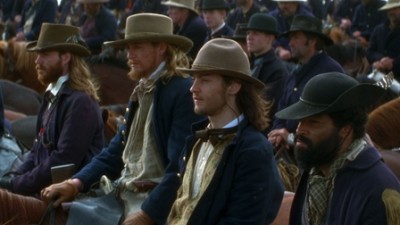It's easy to understand why Ang Lee's 1999 film Ride With the Devil flew under the radar, almost completely unnoticed, during its original brief theatrical release. It is an unusual film, one in which good and evil are intertwined in an uncomfortably gray braid of striated allegiances. Delicately shaded performances (particularly by Jeffrey Wright) ground the propulsive, suspenseful narrative amid a brutal but realistic world.
German-born Jacob Roedel (Tobey Maguire) is a Missouri youth shocked into defense of the South when his neighbor Jack Bull Chiles' (Skeet Ulrich) farm is burned and father killed by a band of jayhawkers - militant irregular pro-Union guerrillas. Jake and Jack Bull join a band of bushwhackers - the pro-Confederacy counterparts to the jayhawkers. They join in league with George Clyde (Simon Baker) and Clyde's best friend, a freed slave named Holt (Jeffrey Wright). After a series of raids under the command of Black John Ambrose (James Caviezel), the smaller group retreats to a rural dugout to wait out the winter.
There, Jack Bull romances their local sponsor's widowed daughter-in-law, Sue Lee (Jewel Kilcher). But the relationship is short-lived; after Jack Bull dies, Roedel and Holt team up again with Ambrose's bushwhackers for increasingly vicious attacks. After a murderous raid at Lawrence, Kansas, Roedel and Holt are both wounded, and from there they escape to a safe farm where Sue Lee has been living since Jack Bull's death. At the farm, Roedel and Holt recover from their wounds and make momentous decisions about the future direction of their lives.
No plot summary, however, can do justice to the film's finely-woven themes. German-born Roedel and former slave Holt come to understand each other thanks to similar experiences with prejudice - and, even more importantly, their muddled sense of identity. Roedel's family, as German immigrants, are fully aligned with the Union - yet Roedel himself becomes a bushwhacker out of loyalty to Jack Bull and because he has considered himself, naturally, a Missourian. Later, he learns that his father has been murdered by another band of bushwhackers, throwing his already precarious sense of identity and political position into chaos.
Holt, meanwhile, is a former slave, who nevertheless finds himself fighting on the side of the Confederacy, like Roedel, due to personal loyalty to a friend. Holt has no illusions about the contradiction inherent in what he is doing; it's his own morality that drives him to stand by Clyde. But after Clyde dies, Holt knows, for the first time, what real freedom feels like.
The intertwined stories of Roedel and Holt elegantly transcend issues of race, just as the characters themselves grow to understand that there are vastly more fundamental questions of the human condition than the color of one's skin. At the same time, the film hardly pretends that race isn't a key issue in American life - the struggles of the past are explicitly related to problems that still exist in our country. All of this is expressed by screenwriter James Schamus and director Ang Lee with a far finer sensibility than I am able to convey through words alone here. Such deep conveyance of a complex and insidious social issue is rare in film. It's not just the way Ride With the Devil "addresses" race; it's the way the story portrays the deeper consequences of racial division upon individual human beings.
Ride With the Devil received a lot of flack for its casting, but I can't find any fault with it. Tobey Maguire has a tendency to come off as "soft," but I think he does a fine job here. He is a good actor who carries most of the picture without showing signs of strain. (Although I do take issue with the scenes of domestic comedy in the movie's final act - Maguire handling a baby in particular - I can't blame the actor.) As Sue Lee, Jewel is mostly credible; the only thing she has working against her is that she's recognizable as a music superstar. Otherwise, her performance is fine, if not spectacular.
As Holt, Jeffrey Wright steals the show. Holt is a difficult character, as written, but Wright brings a sense of moral clarity to Holt's words and actions. I'll even go as far as to say that, thanks to Wright, Holt may be one of the most complex, interesting, and significant characters from the last couple of decades of movies.


No comments:
Post a Comment